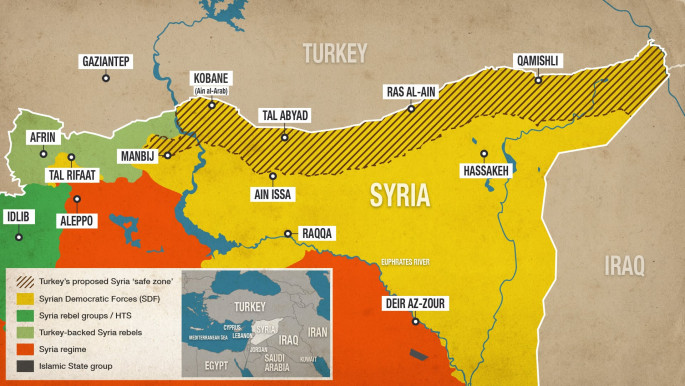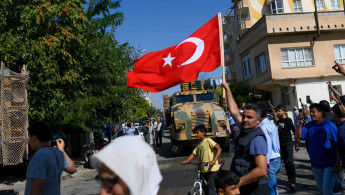EXPLAINER: Where the world stands on Turkey's 'Operation Peace Spring' Syria offensive
Operation Spring of Peace - involving thousands of Syrian rebel fighters backed by Turkish armour and air power - will be discussed in an emergency meeting of the UN Security Council on Thursday.
Ankara's military operation has raised alarm of a new refugee crisis in northern Syria with 60,000 civilians already fleeing areas marked out by Turkey for its "safe zone", currently held by the Syrian Democratic Forces.
There are also concerns that thousands of Islamic State group militants, currently being held in Syrian Kurdish prisons, could now escape amid the unrest.
In scenes all too familiar since the start of Syria's war more than eight years ago, thousands of civilians were seen fleeing their homes on Thursday - in vehicles, on foot and often with their belongings carried on their backs.
The world has been almost united in their condemnation of Turkey's third - but most major - campaign in Syria, but some nations have been stronger in their rebukes than others.
Let's start with the United States...
President Donald Trump has tried to justify the de facto green-light he appeared to gift his Turkish counterpart Recep Tayyip Erdogan when he pulled American troops out of the areas earmarked for the "safe zone".
Many in the US see the assault as a blatant betrayal of Washington's erstwhile Kurdish allies who played a key role in the defeat of IS.
Trump has since tried to weather the international and domestic backlash he received for ordering the pull-back of US troops in the area, warning he would "wipe out" Turkey's economy if the operation was not conducted "in as humane a way as possible".
 |
His move was met with scorn from members of his own party.
Senior Republican Senator Lindsey Graham argued the US administration had "shamelessly abandoned" the Kurds.
Ankara also faces the threat of "sanctions from hell" as a bipartisan group of senators introduced legislation that would freeze all US assets of Turkey's leadership, including Erdogan, and impose sanctions on entities that do business with Turkey's military.
There seems to be mixed messages coming from the United States government, with Secretary of State Mike Pompeo saying Wednesday that Washington does not approve of Turkey's latest offensive in Syria.
Where does the European Union stand?
The EU has urged Turkey to halt the assault in Syria, but has not taken any action. The bloc's foreign ministers will discuss the crisis at a regular meeting on Monday.
[text finishes below]
France has been, perhaps, the most outspoken in condemning Ankara, summoning the Turkish ambassador to Paris on Thursday over the air and ground offensive.
An angry-looking French President Emmanuel Macron said Thursday that he "vehemently" condemned the operation, warning Turkey risks helping IS to "rebuild its caliphate".
Read also: Erdogan threatens to 'flood Europe' with millions of refugees
The Netherlands and Italy have also summoned their Turkey ambassadors to condemn Ankara's assault.
How did Israel react?
Israel on Thursday slammed the move, calling it an "invasion" and warning against the "ethnic cleansing" of the Kurdish people.
|
"Israel is prepared to extend humanitarian assistance to the gallant Kurdish people," Prime Minister Benjamin Netanyahu said in a statement.
Although the US leader's perceived abandonment of the Kurds has provoked deep concern in Israel, Prime Minister Benjamin Netanyahu has been careful not to be too critical of the White House's decision, lest he angers Trump.
What about Arab states in the Middle East?
The region's foreign ministers will gather in Cairo on Saturday for an emergency meeting "to discuss Turkish aggression on Syrian territory", Hossam Zaki, the Arab League's assistant secretary-general said Wednesday.
Saudi Arabia condemned Turkey's offensive Wednesday, saying the Turkish army's "aggression" would have "negative repercussions on the security and stability of the region".
Egyptian President Abdel Fattah al-Sisi on Thursday criticised the offensive. In a meeting with Jordan's King Abdullah II, Sisi "affirmed Egypt's rejection of the Turkish aggression on Syria's territory and sovereignty".
What was Russia's reaction?
Moscow, which came to the military assistance of the Syrian regime in 2015, has so far urged Erdogan to show restraint.
On Thursday, Russian Foreign Minister called for dialogue between Turkey and the Syrian regime on the issue of Kurdish forces in northern Syria.
Moscow will "see what can be done" in using its "good relations with all parties" to prevent another crisis in Syria, Lavrov said.
Read also: What happens next? Turkey launches a new offensive in Syria
As The Guardian's Diplomatic Editor Patrick Wintout so aptly pointed out: "With the US leaving the scene, [Putin] may try to forge his own 'deal of the century' between Erdogan, the Syrian regime and the Kurds."
And Syrian President Bashar al-Assad’s other ally Iran?
Iran called Thursday for an immediate halt to Turkey's offensive on Kurdish-ruled northeastern Syria, citing concern for the dangers to civilians in the conflict zone.
|
"Iran... emphasises (the need for) an immediate halt to the assault and the departure of Turkish military units from Syrian territory," the foreign ministry said in a statement.
In a phone call Tuesday between Iranian Foreign Minister Mohammed Javad Zarif and his Turkish counterpart Mevlut Cavusoglu. The Iran foreign minister said the "Adana agreement" was "the best approach for Syria and Turkey and for addressing their concerns".
In-depth: Proposed revival of 'Adana solution' is unlikely to appeal to Turkey
So where does the Syrian regime stand in all of this?
The Syrian regime will likely seek to exploit the Turkish offensive against Kurdish forces that were the mainstay of the US-led campaign against the IS in Syria.Since the regime brutally suppressed anti-government protests in Syria's Arab Spring eight year ago, it has sought to gain back any lost territory - often at the severe cost of infrastructure and civilian lives.
It might not look at a collapse of the Kurdish forces to win back territory in eastern Syria.
Have any other major powers voiced concerns?
China said Thursday that Syria's sovereignty and territorial integrity "must be respected".
Turkey's fellow NATO member Norway suspended all new arms exports to Turkey on Thursday "as a precautionary measure".
As statements continue to be issued over the coming weeks, and perhaps the coming months, on Turkeys "Operation Peace Spring", civilians will undoubtably bear the brunt of the offensive.With the death toll mounting and tens of thousands of civilians fleeing the area, international condemnation of Turkey's offensive may be too little too late.
Agencies contributed to this report.
Follow us on Twitter: @The_NewArab




 Follow the Middle East's top stories in English at The New Arab on Google News
Follow the Middle East's top stories in English at The New Arab on Google News


